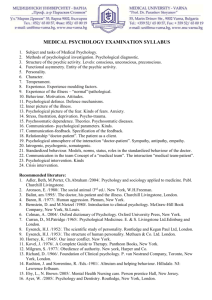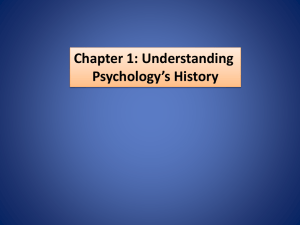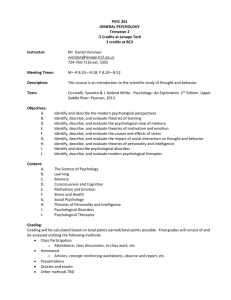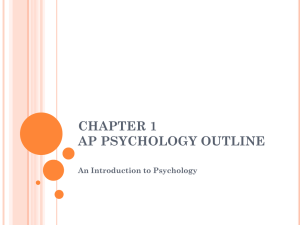Set_Theory
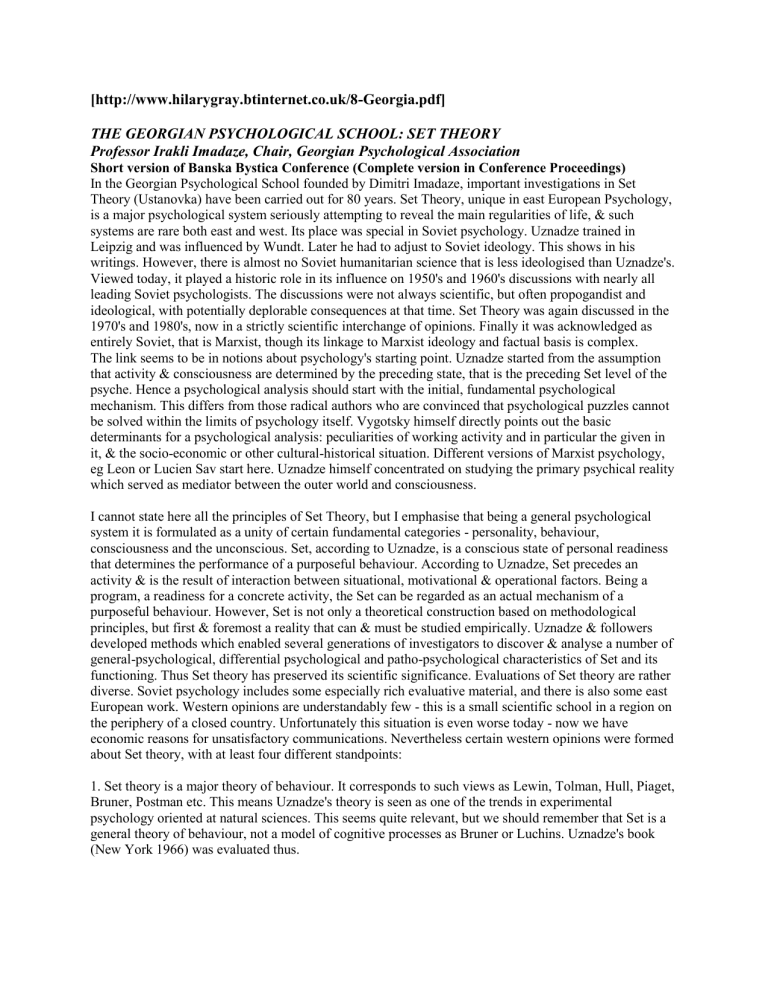
[http://www.hilarygray.btinternet.co.uk/8-Georgia.pdf]
THE GEORGIAN PSYCHOLOGICAL SCHOOL: SET THEORY
Professor Irakli Imadaze, Chair, Georgian Psychological Association
Short version of Banska Bystica Conference (Complete version in Conference Proceedings)
In the Georgian Psychological School founded by Dimitri Imadaze, important investigations in Set
Theory (Ustanovka) have been carried out for 80 years. Set Theory, unique in east European Psychology, is a major psychological system seriously attempting to reveal the main regularities of life, & such systems are rare both east and west. Its place was special in Soviet psychology. Uznadze trained in
Leipzig and was influenced by Wundt. Later he had to adjust to Soviet ideology. This shows in his writings. However, there is almost no Soviet humanitarian science that is less ideologised than Uznadze's.
Viewed today, it played a historic role in its influence on 1950's and 1960's discussions with nearly all leading Soviet psychologists. The discussions were not always scientific, but often propogandist and ideological, with potentially deplorable consequences at that time. Set Theory was again discussed in the
1970's and 1980's, now in a strictly scientific interchange of opinions. Finally it was acknowledged as entirely Soviet, that is Marxist, though its linkage to Marxist ideology and factual basis is complex.
The link seems to be in notions about psychology's starting point. Uznadze started from the assumption that activity & consciousness are determined by the preceding state, that is the preceding Set level of the psyche. Hence a psychological analysis should start with the initial, fundamental psychological mechanism. This differs from those radical authors who are convinced that psychological puzzles cannot be solved within the limits of psychology itself. Vygotsky himself directly points out the basic determinants for a psychological analysis: peculiarities of working activity and in particular the given in it, & the socio-economic or other cultural-historical situation. Different versions of Marxist psychology, eg Leon or Lucien Sav start here. Uznadze himself concentrated on studying the primary psychical reality which served as mediator between the outer world and consciousness.
I cannot state here all the principles of Set Theory, but I emphasise that being a general psychological system it is formulated as a unity of certain fundamental categories - personality, behaviour, consciousness and the unconscious. Set, according to Uznadze, is a conscious state of personal readiness that determines the performance of a purposeful behaviour. According to Uznadze, Set precedes an activity & is the result of interaction between situational, motivational & operational factors. Being a program, a readiness for a concrete activity, the Set can be regarded as an actual mechanism of a purposeful behaviour. However, Set is not only a theoretical construction based on methodological principles, but first & foremost a reality that can & must be studied empirically. Uznadze & followers developed methods which enabled several generations of investigators to discover & analyse a number of general-psychological, differential psychological and patho-psychological characteristics of Set and its functioning. Thus Set theory has preserved its scientific significance. Evaluations of Set theory are rather diverse. Soviet psychology includes some especially rich evaluative material, and there is also some east
European work. Western opinions are understandably few - this is a small scientific school in a region on the periphery of a closed country. Unfortunately this situation is even worse today - now we have economic reasons for unsatisfactory communications. Nevertheless certain western opinions were formed about Set theory, with at least four different standpoints:
1. Set theory is a major theory of behaviour. It corresponds to such views as Lewin, Tolman, Hull, Piaget,
Bruner, Postman etc. This means Uznadze's theory is seen as one of the trends in experimental psychology oriented at natural sciences. This seems quite relevant, but we should remember that Set is a general theory of behaviour, not a model of cognitive processes as Bruner or Luchins. Uznadze's book
(New York 1966) was evaluated thus.
2. Set theory as a model of Cognitive Processes. Some reviewers expressed the opinion that it was a work about perceptual illusions. Uznadze's classical experiments do confirm perceptual illusions, but these effects, named Uznadze's effect by Piaget, acquire scientific value only as indicators of an underlying mechanics, ie Set. This is also confirmed by observation of similar effects in other spheres of activity - thinking, memory, motorics, etc.
3. Set Theory and physiological models. In Soviet Psychology (London 1975) McLeish qualifies set
Theory as a variety of Anokhin's version of Pavlov's teaching. This is wrong. Presumably it came directly from Anokhin, who identified the Action Acceptor with the Set concept. There were several other attempts to compare Set Theory with various physiological models. But it is one thing to search for physiological models of Set, and another to regard mechanisms and Set as mutually identical. The latter is reductionism.
4. Set psychology as "Soviet Freudianism" eg Graham Lawrence (MIT). One can understand this because the unconcious is central for both. There are few theoretical systems in experimental psychology where a concept of unconcious is as important as in Set theory. Given the complicated interrelationships between psychoanalysis and experimental psychology, one can understand the attempt to find an alternative to psychoanalysis, which Set theory may seem. This was the rationale for the 1979 Tblisi conference; the big methodological and conceptual differences discouraged on-going dialogue between psychoanalysts and
Set theorists: Freud's and Uznadze's views can only be compared after linking psychoanalytic and experimental psychology, which is difficult.
In conclusion, I must say that Psychology, like other sciences in Georgia, is having the hardest times with practically no conditions for quality scientific work. The lack of information and scientific contacts is the most frustrating. At the same time, Set theory's potential is not exhausted either for perfection of the model or for its practical application. The unique psychological domain of Georgia should not be destroyed because of economic and social adversities.
